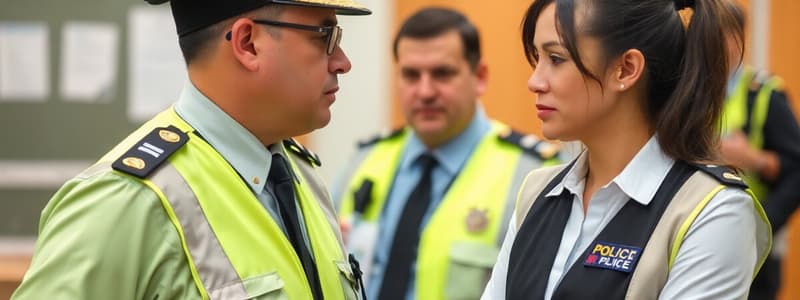Podcast
Questions and Answers
What is the definition of quid pro quo harassment in the workplace?
What is the definition of quid pro quo harassment in the workplace?
- Offering something in exchange for sexual favors. (correct)
- Making verbal advances without expectation of return.
- Implying rewards for personal relationships unrelated to work.
- Creating a hostile work environment through sexual humor.
Which behavior is considered sexual harassment?
Which behavior is considered sexual harassment?
- Inviting a colleague for coffee.
- Discussing personal hobbies during breaks.
- Giving compliments about someone's outfit.
- Displaying inappropriate messages on social media. (correct)
How can physical actions be related to sexual harassment?
How can physical actions be related to sexual harassment?
- By touching someone without consent. (correct)
- Only when sexual jokes are included.
- Through gestures that are misinterpreted.
- By involving only verbal communication.
What can enhance a hostile work environment?
What can enhance a hostile work environment?
What should a victim of harassment do if the behavior escalates to criminal activity?
What should a victim of harassment do if the behavior escalates to criminal activity?
What distinguishes sexual harassment from other forms of workplace conflict?
What distinguishes sexual harassment from other forms of workplace conflict?
What is an example of non-verbal sexual harassment?
What is an example of non-verbal sexual harassment?
Which statement about the definition of a workplace is correct?
Which statement about the definition of a workplace is correct?
Which of the following actions is NOT a form of sexual harassment?
Which of the following actions is NOT a form of sexual harassment?
What can be a consequence of ignoring sexual harassment in the workplace?
What can be a consequence of ignoring sexual harassment in the workplace?
What is the primary biological response to trauma as highlighted in the content?
What is the primary biological response to trauma as highlighted in the content?
Which of the following is NOT identified as a potential long-term response to stress?
Which of the following is NOT identified as a potential long-term response to stress?
What is a common indicator of stress among law enforcement officers?
What is a common indicator of stress among law enforcement officers?
What could long-term stress response lead to in an individual's life?
What could long-term stress response lead to in an individual's life?
How might chronic stress impact an officer's personal life?
How might chronic stress impact an officer's personal life?
What is a significant risk for law enforcement officers due to stress, according to the content?
What is a significant risk for law enforcement officers due to stress, according to the content?
What can be a potential behavioral change indicating stress in an officer?
What can be a potential behavioral change indicating stress in an officer?
What misconception might Officer Hernandez's colleagues have regarding therapy?
What misconception might Officer Hernandez's colleagues have regarding therapy?
What type of stress is associated with job performance-related responses?
What type of stress is associated with job performance-related responses?
Which of the following health-related stress responses can occur due to unmanaged stress?
Which of the following health-related stress responses can occur due to unmanaged stress?
What is the primary function of an officer when initially interacting with a victim?
What is the primary function of an officer when initially interacting with a victim?
What can happen if the enforcer role is used excessively by an officer?
What can happen if the enforcer role is used excessively by an officer?
Emotional intelligence in an officer primarily helps with which of the following?
Emotional intelligence in an officer primarily helps with which of the following?
How can engaging with community members enhance an officer's emotional intelligence?
How can engaging with community members enhance an officer's emotional intelligence?
What does the commitment to service mean for an officer, regardless of their role?
What does the commitment to service mean for an officer, regardless of their role?
What is NOT a characteristic of someone with high emotional intelligence?
What is NOT a characteristic of someone with high emotional intelligence?
What should officers seek from their fellow officers and command staff to improve emotional intelligence?
What should officers seek from their fellow officers and command staff to improve emotional intelligence?
Why is it necessary for officers to manage their own emotions during chaotic situations?
Why is it necessary for officers to manage their own emotions during chaotic situations?
What is a significant role that officers must be prepared to shift into when necessary?
What is a significant role that officers must be prepared to shift into when necessary?
What is a common misconception among law enforcement officers regarding seeking help for mental health?
What is a common misconception among law enforcement officers regarding seeking help for mental health?
Which statement is a stigma related to mental health in law enforcement?
Which statement is a stigma related to mental health in law enforcement?
What action can law enforcement officials take to enhance their personal resilience?
What action can law enforcement officials take to enhance their personal resilience?
Under what circumstances can a mental health professional break confidentiality?
Under what circumstances can a mental health professional break confidentiality?
Why might law enforcement officers neglect their mental health?
Why might law enforcement officers neglect their mental health?
What approach is suggested for law enforcement to cope with secondary trauma and compassion fatigue?
What approach is suggested for law enforcement to cope with secondary trauma and compassion fatigue?
What is the primary consequence of stereotyping in law enforcement?
What is the primary consequence of stereotyping in law enforcement?
Which statement best describes prejudice in the context of law enforcement?
Which statement best describes prejudice in the context of law enforcement?
How can discrimination affect the relationship between law enforcement and communities?
How can discrimination affect the relationship between law enforcement and communities?
Which of the following is NOT a characteristic of discriminatory practices?
Which of the following is NOT a characteristic of discriminatory practices?
What can occur when law enforcement officers allow stereotypes to influence their work?
What can occur when law enforcement officers allow stereotypes to influence their work?
Which of the following correctly defines stereotyping?
Which of the following correctly defines stereotyping?
What is a potential outcome of making false assumptions based on stereotypes?
What is a potential outcome of making false assumptions based on stereotypes?
Why is it important for law enforcement officers to avoid prejudice and discrimination?
Why is it important for law enforcement officers to avoid prejudice and discrimination?
What emotional response might occur if someone acts on their prejudices?
What emotional response might occur if someone acts on their prejudices?
Which of the following statements highlights the danger of stereotypes in investigatory contexts?
Which of the following statements highlights the danger of stereotypes in investigatory contexts?
Flashcards are hidden until you start studying
Study Notes
Emotional Intelligence
- Emotional intelligence is the ability to identify and cope with one's own emotions, as well as understand and manage the emotions of others.
- Police officers with higher emotional intelligence can recognize and adapt to different situations.
- Officers with higher emotional intelligence are able to manage their own emotions during stressful situations.
- Emotional intelligence is a skill that can be improved through self-reflection, feedback, and community engagement.
- Developing emotional intelligence can make officers better at their jobs and enhance their safety.
Harassment
- Harassment is any behavior that creates a hostile work environment.
- Examples of hostile work environment behavior include:
- Posting inappropriate pictures or posters in communal spaces.
- Making unwelcome sexual advances.
- Pressuring someone for dates.
- Ridiculing someone with sexual messages.
- Making suggestive facial gestures or body language.
- Displaying nude images.
- Engaging in inappropriate forms of touching, hugging, or patting.
- Quid pro quo harassment is a form of harassment where a supervisor demands sexual favors from an employee in exchange for continued employment.
- Sexual harassment is a form of discrimination.
- Agencies should provide trained staff to handle sexual harassment complaints and provide support to victims.
Stereotyping, Prejudice, and Discrimination
- Stereotyping is judging a group of people based on preconceived notions, regardless of individual differences.
- Prejudice is an unjustified and baseless attitude towards a person based solely on their membership in a social group.
- Discrimination is acting on prejudice, often with harmful consequences.
- Stereotypes, prejudice, and discrimination can hinder effective law enforcement by leading to false assumptions and hindering fair investigations.
- Officers should avoid these harmful practices to ensure fair treatment and maintain trust with the community.
Understanding Stress
- Law enforcement officers are at higher risk for stress, including acute, routine, and traumatic stress.
- Stress responses can include increased anxiety, tension, irritability, headaches, blood pressure changes, sleep disturbances, inconsistent work habits, and decreased productivity.
- Long-term stress responses can lead to depression, suicidal thoughts, and chronic health problems.
- Officers must monitor themselves and their colleagues for warning signs of stress:
- Sudden behavioral changes.
- Inconsistent work habits.
- Accidents or injuries.
- Frequent tiredness.
- Sleeping and eating disorders.
- Anxiety.
- Alcohol and drug misuse.
- Complaints from others.
- Seeking professional help for mental health issues is encouraged and should not be stigmatized within the law enforcement community.
Fostering Resilience and Mental Health
- Stigma around seeking mental health support can prevent officers from getting the help they need.
- Mental health is just as important as physical health.
- Officers seeking mental health support from licensed professionals should feel comfortable doing so, as it is confidential.
- Building personal resilience through practices like mindfulness, self-care, and seeking professional guidance can help officers cope with trauma and compassion fatigue.
- Scheduling regular mental health checkups with a licensed therapist or psychiatrist is recommended for long-term well-being.
Studying That Suits You
Use AI to generate personalized quizzes and flashcards to suit your learning preferences.



